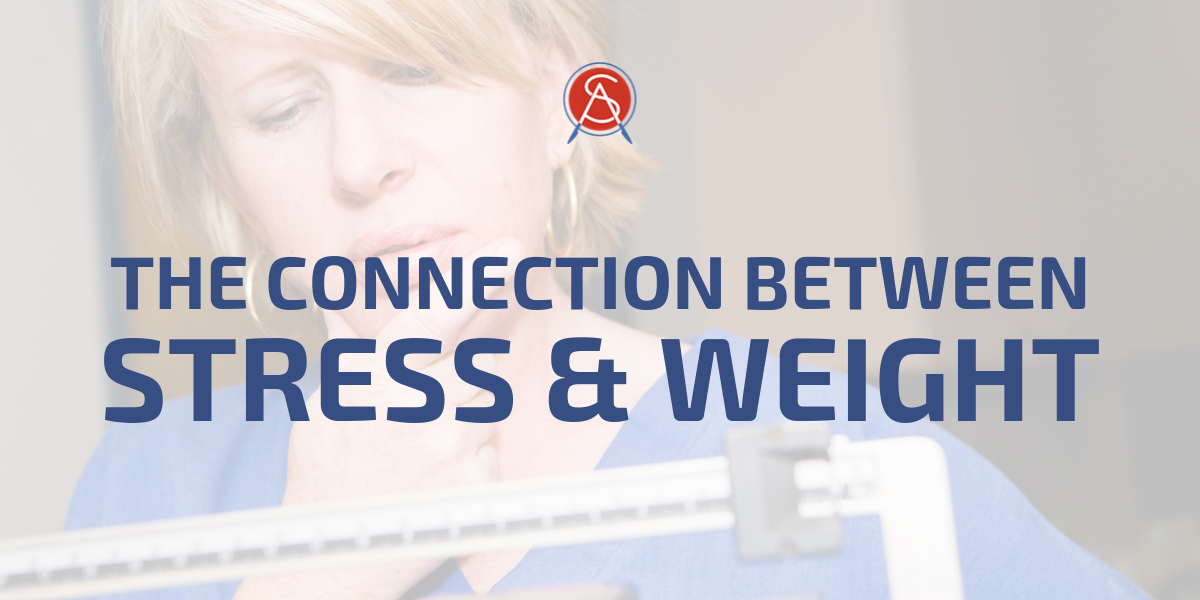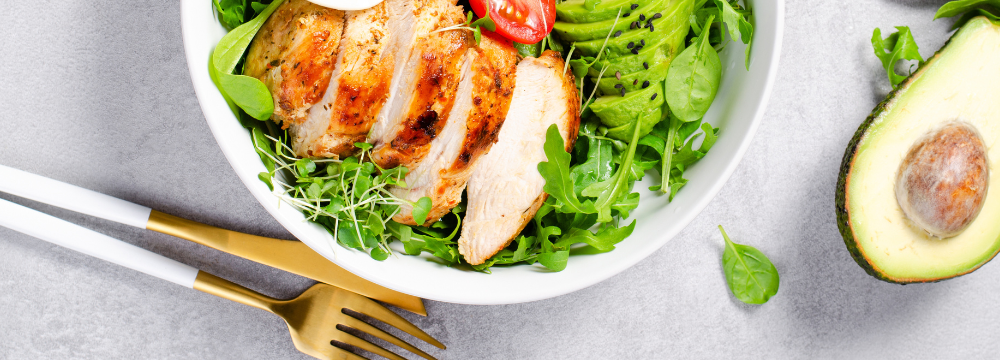While you hear of some people losing weight during a stressful time, stress is often a large contributor to weight gain. The causes behind weight gain related to stress are typically a combination of several factors including hormones, psychological factors and lifestyle choices that an individual uses cope with their stress.

You body’s hormonal reaction to stress
When a stressful event occurs, be it a big project at work or a traffic jam, your body has a noticeable response. For most, you notice an immediate anxiety reaction, be it sweating, feeling flushed in your cheeks, or rapid heart rate. These are your hormones starting to react, namely epinephrine and norepinephrine. Typically, these two hormones suppress appetite as they are preparing your body for the immediate, innate fight or flight response. No one likes to run or fight on a full stomach! Following this immediate rush comes cortisol, more commonly referred to as the “stress hormone.” Cortisol is the hormone that makes us want to comfort ourselves with high calorie foods. It is intended to create an insulin release in the body and cause other natural reactions that are known to more readily contribute to excess abdominal fat.
But why does this happen? Don’t our bodies know that gaining weight isn’t going to help us feel less stressed, and will probably make us MORE stressed? The short answer is “no.” When our body is reacting to stress, it is assuming that we needed to use up a lot of calories, maybe even precious stored calories from fat, to deal with the stressful event. In reality, the stressors in our modern lives are more often about traffic making us late rather than something threatening a deadly chase. You aren’t likely to burn many calories checking the clock. Despite the different stressor, the body’s classic response is the same.
Time crunches lead to short cuts
Stress often comes from the underlying issue of time management. For many of us, it never seems like there is enough time in the day to get it all done. This chronic time crunch not only leaves us feeling stressed constantly, it also helps us to fall into traps of convenience. The truth is, making healthy choices often requires planning ahead. Without preparation, we are apt to choose the quick, available snacks. When the vending machine is your source of sustenance, you are less likely to be choosing a high fiber or protein packed snack or meal replacement and more likely to end up with a sugary snack that will send your body on a blood sugar rollercoaster. Exhausted from a long day? Fast food to the rescue! Except for the fact that fast food is most often high in calories, and especially saturated fats, sodium, and processed carbohydrates. Even opting for a “healthier” menu item is often a trap. A salad will likely be loaded with ingredients that do more harm than good for the waistline.
Another short cut we often take is skipping meals altogether. Whether from being too wrapped up in a task to stop and recognize your hunger cues, or willfully ignoring them to steal the few minutes back for what needs to get done, it will end up hurting you. While the mantra that a reduction in calories leads to weight loss has pervaded society, we know that skipping meals leads to weight gain, both leading us to overeating when we do eat and disrupting our normal metabolism by telling our body that it isn’t going to be fed, so it should hold on to what it gets. Does, “I can splurge on this double portion of creamy pasta! I haven’t eaten all day!” sound familiar?
Another thing cheat ourselves on is adequate hydration. Many people only drink during meals, and often aren’t choosing good, old-fashioned water. If you are skipping meals during the day, you may also be skipping out of drinking as well. Caffeine is typically considered a friend of the stressed as its stimulant qualities trick you into ignoring when your body needs rest and allows you to push through. Caffeine is a diuretic, meaning it is dehydrating, and many of the caffeine boosts we choose are also high in sugar and other additives. The crash that follows this bump is often harsh. Dehydration can also lead to headaches and feeling sluggish, neither of which helps you to accomplish your tasks.
Cyclical stress and exhaustion
Stress is the gift that keeps on giving. It is not often a one and done situation. For most of us, we have both situational stress and chronic stressors. Furthering this cycle is that we often combat our stress with things likely to cause more stress down the road. Weight gain is a prime example of this. If your main stressor is time, you take short cuts and try to squeeze as much time from the day as possible. In doing this, you both exacerbate your stress and create unhealthy habits that cause stubborn weight gain. Now you have all of your same stressors, plus excess weight to address. How can you be expected to eat right and exercise when you’re already using up every possible minute? Your stress has given you something new to stress over.
Feeling exhausted yet? Sleep issues and stress go hand in hand for many. We know that stress can lead to lost sleep just as well as losing sleep can amplify stress. This not only causes your body to feel physically stressed, but with inadequate rest, you may also consume more calories during the day. To compound this, we too frequently cut our sleep short to squeeze more hours out of the day. Whether you are taking an hour from your morning rest to allow for an extra hour of work or to make up for squeezing in a social appointment later in the day, sometimes your body truly needs to rest and reset to best perform.
So, yes, stress can cause weight gain. Stay tuned for our next blog post on how to solve stress with today’s hectic lifestyles








